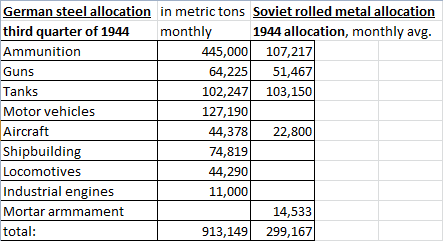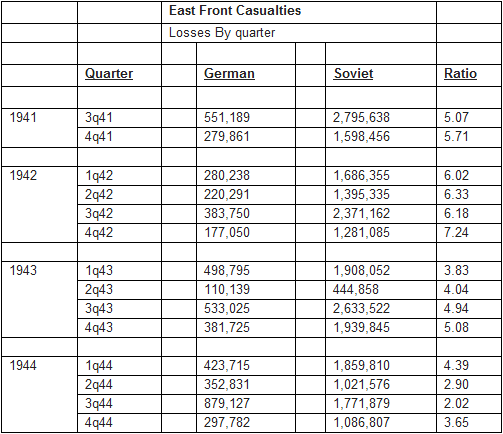sandeepmukherjee196 wrote:Kingfish wrote:Guaporense wrote:Actually, the 1942 offensive can be understood to be a mistake now, it would be more rational for Germany to simply dig up in 1942 and try to fortify and stabilize the frontlines, enabling maximum exchange ratio with the Red Army to not consume much manpower. Well, that was what Guderian advocated but only after Stalingrad.
Handing back the initiative and reverting to attrition warfare against an enemy that would very much welcome a respite to build up a land army the likes of which history has never seen would have been the epitome of military suicide.
Hi Kingfish...
I agree with you and am surprised with the line of thought of Guaporense. I don't recollect ever coming across this paradigm i.e., no one has ever said that it would have been the correct strategy for the Wehrmacht to dig their heels in circa 1942 and let the Soviets take the initiative.
Heinz Guderian said that that it what they should have done but he said that in mid 1943: the Eastern front should be fortified to reduce it's manpower requirements, to free manpower up to defend the West. Have you heard of him? After Barbarossa failed it was clear that they wouldn't be able to just finish the USSR off in a large battle of annihilation. So instead they should have tried to maximize their attrition rate to wear down the Red Army up to the point it would give up attacking. In 1942-1943 they were exchanging about 5-6 soldiers to 1, in Soviet offensives against fortified positions they were losing upwards to 10 men to 1 casualty inflicted.
Anyway, that's essentially what the Wehrmacht did during the last 2.5 years of WW2 and it didn't turn out well, but it was the best response strategy given what was happening: the were fighting with numerical inferiority everywhere so defend-defend-defend was the appropriate strategy to maximize the probability of survival of the Nazi regime. However there were many ways in which efficiency of this strategy could have been improved from history.
If ever there was a Nation and its military that couldn't afford a dug in war of attrition, it was Germany and Wehrmacht in WWII. And that too in the east. I read above that this poster alludes to the Russian mobilisation of 35 million personnel. But was that surprising or unexpected? Surely Hitler knew about the manpower pool of USSR? He knew about the trans Ural industrial base? He knew that a single tank factory in the Urals could outproduce the entire German tank manufacturing setup?
First, German industrial resources were enormously superior to Soviet industrial resources, in terms of coal and coke, it was ca. 450 million tons for Germany's Grossraum in 1942-1943 compared to ca. 65 million tons in the USSR in 1942-1943. The number of tanks produced is not a relevant statistic since the Soviets just allocated a larger fraction of their military expenditures on tanks than the Germans did. If you measure by volume of heavy ammunition rounds produced (ver 75 mm), during the war German output was triple of the Soviet output and by mid 1944 they were spending 4 times more steel on production of ammunition:

This is "rolled steel" figures which I took from the USSBS report on the ordinance industry.
The USSR's advantage was manpower, Germany's advantage in the Eastern front was firepower.
For a military whose primary war strategy in the east was to wrap things up in a few weeks, the very thought of digging in after a year and prepare for a long war of attrition, was like a fish looking for a bicycle!

Historically, they didn't have the manpower strength to execute a large scale Barbarossa style offensive after Barbarossa failed.
Instead they tried a limited scale offensive in 1942 and went deep inside the USSR just to be cut off and encircled and annihilated. If they didn't do that the German army would lose fewer men and the Red Army would lose more men, than what happened historically.
"In tactics, as in strategy, superiority in numbers is the most common element of victory." - Carl von Clausewitz


